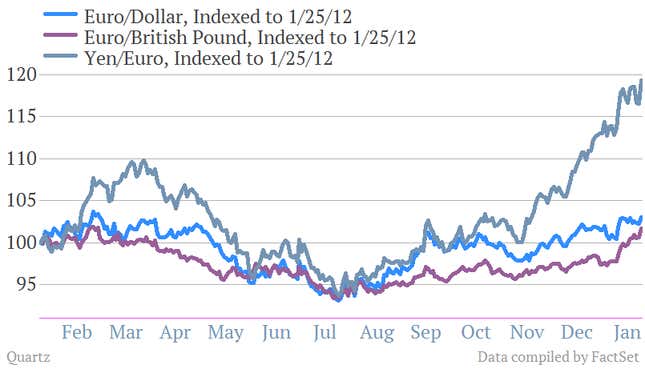
The euro is rallying today to its strongest value in a year. It’s just the start of a trend for a currency that’s likely to appreciate over the coming months, as the US Federal Reserve and the Bank of Japan continue down the road of ultra-easy monetary policy. And that’s problematic for efforts to get euro zone economies back on track, as a stronger euro makes European goods and services more expensive for foreign buyers.
This all plays into recent discussions of a currency war in which countries around the globe are angling for cheaper currencies. My colleague Matt Phillips has argued that this competition won’t be like the currency war 2010, in which emerging market nations interpreted new, nontraditional monetary policy easing measures as malicious actions inhibiting their trade opportunities. However, there nonetheless seems to be a race between major developed market economies to keep pushing their currencies cheaper—and Europe is falling behind.
The euro’s nascent strength is less a function of the strength of the euro area than it is a result of the European Central Bank’s hawkish monetary policy. Last year, the ECB—in an attempt to prevent the banking sector from completely halting lending and Spain and Italy from defaulting— extended three-year loans to banks for crappy collateral at ultra-low borrowing rates. Banks had two opportunities to take advantage of these “loans,” which are known as long-term refinancing operations (LTROs). As part of the terms, banks could pay back the funds in a year if they chose, and are allowed to pay the money back weekly at any point thereafter.
Today, the ECB announced that 287 banks would pay back €137 billion ($184 billion) in LTRO funds. That’s roughly half the 523 banks that took part in the first LTRO offered last year, and roughly a quarter of the €489 billion ($657 billion) that was doled out in the initial operation. Analysts have seen this as a testament to banks’ strength relative to a year ago, though there’s a concern that some banks that should be hanging onto the cheap cash won’t be doing so for reputational reasons.
More immediately, however, this contracts the ECB’s balance sheet and amounts to a subtle tightening of the money supply. That’s why euros are more expensive today; there are simply fewer of them hanging around. The ECB will begin to absorb those funds next week, but currency futures trade ahead of the curve, causing exchange rates to change.
But it’s unlikely that the ECB will loosen its policy further. It has stubbornly refused to lower interest rates below 0.75%, and cut rates to this point only after it became absolutely necessary.
“The commitment to what you might call a hard currency approach, sound currency, puts the ECB and Europe at odds with the rest of the world, and what I expect this year is much greater turbulence on the exchange rate front,” said George Soros in an interview with Bloomberg TV this week. “[We should be afraid] of that. There’s been remarkable calm and cooperation up until now. And now with Europe an outlier against the rest of the world, this is going to create pressures on the exchange-rate front…The likelihood is that the recession is going to get deeper because Germany is going to lose competitiveness with now Japan.”
Earlier this week, we remarked that this policy makes the ECB the first major central bank to actually roll back—not just halt—its ultra-easy monetary policies. That’s going to inflate the currency against others, where central banks are pushing values down rather than up. If a “currency war” to keep currencies cheap starts happening, this leaves Europe in a tough position, particularly if it’s trying to stimulate exports in the periphery.



